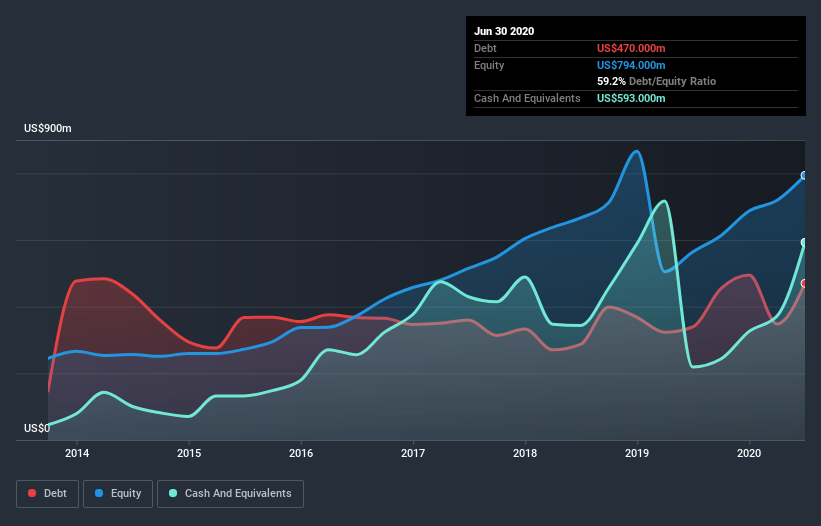Is Constellation Software (TSE:CSU) Using Too Much Debt?

Legendary fund manager Li Lu (who Charlie Munger backed) once said, 'The biggest investment risk is not the volatility of prices, but whether you will suffer a permanent loss of capital.' It's only natural to consider a company's balance sheet when you examine how risky it is, since debt is often involved when a business collapses. As with many other companies Constellation Software Inc. (TSE:CSU) makes use of debt. But the real question is whether this debt is making the company risky.
What Risk Does Debt Bring?
Generally speaking, debt only becomes a real problem when a company can't easily pay it off, either by raising capital or with its own cash flow. In the worst case scenario, a company can go bankrupt if it cannot pay its creditors. However, a more common (but still painful) scenario is that it has to raise new equity capital at a low price, thus permanently diluting shareholders. By replacing dilution, though, debt can be an extremely good tool for businesses that need capital to invest in growth at high rates of return. When we examine debt levels, we first consider both cash and debt levels, together.
See our latest analysis for Constellation Software
What Is Constellation Software's Net Debt?
The image below, which you can click on for greater detail, shows that at June 2020 Constellation Software had debt of US$470.0m, up from US$339.0m in one year. However, its balance sheet shows it holds US$593.0m in cash, so it actually has US$123.0m net cash.
How Healthy Is Constellation Software's Balance Sheet?
The latest balance sheet data shows that Constellation Software had liabilities of US$1.88b due within a year, and liabilities of US$1.09b falling due after that. On the other hand, it had cash of US$593.0m and US$590.0m worth of receivables due within a year. So it has liabilities totalling US$1.79b more than its cash and near-term receivables, combined.
Since publicly traded Constellation Software shares are worth a very impressive total of US$23.5b, it seems unlikely that this level of liabilities would be a major threat. Having said that, it's clear that we should continue to monitor its balance sheet, lest it change for the worse. While it does have liabilities worth noting, Constellation Software also has more cash than debt, so we're pretty confident it can manage its debt safely.
And we also note warmly that Constellation Software grew its EBIT by 12% last year, making its debt load easier to handle. The balance sheet is clearly the area to focus on when you are analysing debt. But ultimately the future profitability of the business will decide if Constellation Software can strengthen its balance sheet over time. So if you want to see what the professionals think, you might find this free report on analyst profit forecasts to be interesting.
Finally, a business needs free cash flow to pay off debt; accounting profits just don't cut it. While Constellation Software has net cash on its balance sheet, it's still worth taking a look at its ability to convert earnings before interest and tax (EBIT) to free cash flow, to help us understand how quickly it is building (or eroding) that cash balance. Over the last three years, Constellation Software actually produced more free cash flow than EBIT. There's nothing better than incoming cash when it comes to staying in your lenders' good graces.
Summing up
We could understand if investors are concerned about Constellation Software's liabilities, but we can be reassured by the fact it has has net cash of US$123.0m. And it impressed us with free cash flow of US$998m, being 146% of its EBIT. So we don't think Constellation Software's use of debt is risky. The balance sheet is clearly the area to focus on when you are analysing debt. However, not all investment risk resides within the balance sheet - far from it. Consider risks, for instance. Every company has them, and we've spotted 2 warning signs for Constellation Software you should know about.
When all is said and done, sometimes its easier to focus on companies that don't even need debt. Readers can access a list of growth stocks with zero net debt 100% free, right now.
This article by Simply Wall St is general in nature. It does not constitute a recommendation to buy or sell any stock, and does not take account of your objectives, or your financial situation. We aim to bring you long-term focused analysis driven by fundamental data. Note that our analysis may not factor in the latest price-sensitive company announcements or qualitative material. Simply Wall St has no position in any stocks mentioned.
Have feedback on this article? Concerned about the content? Get in touch with us directly. Alternatively, email editorial-team@simplywallst.com.

